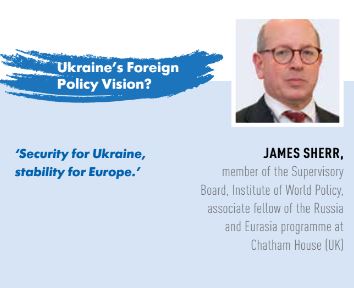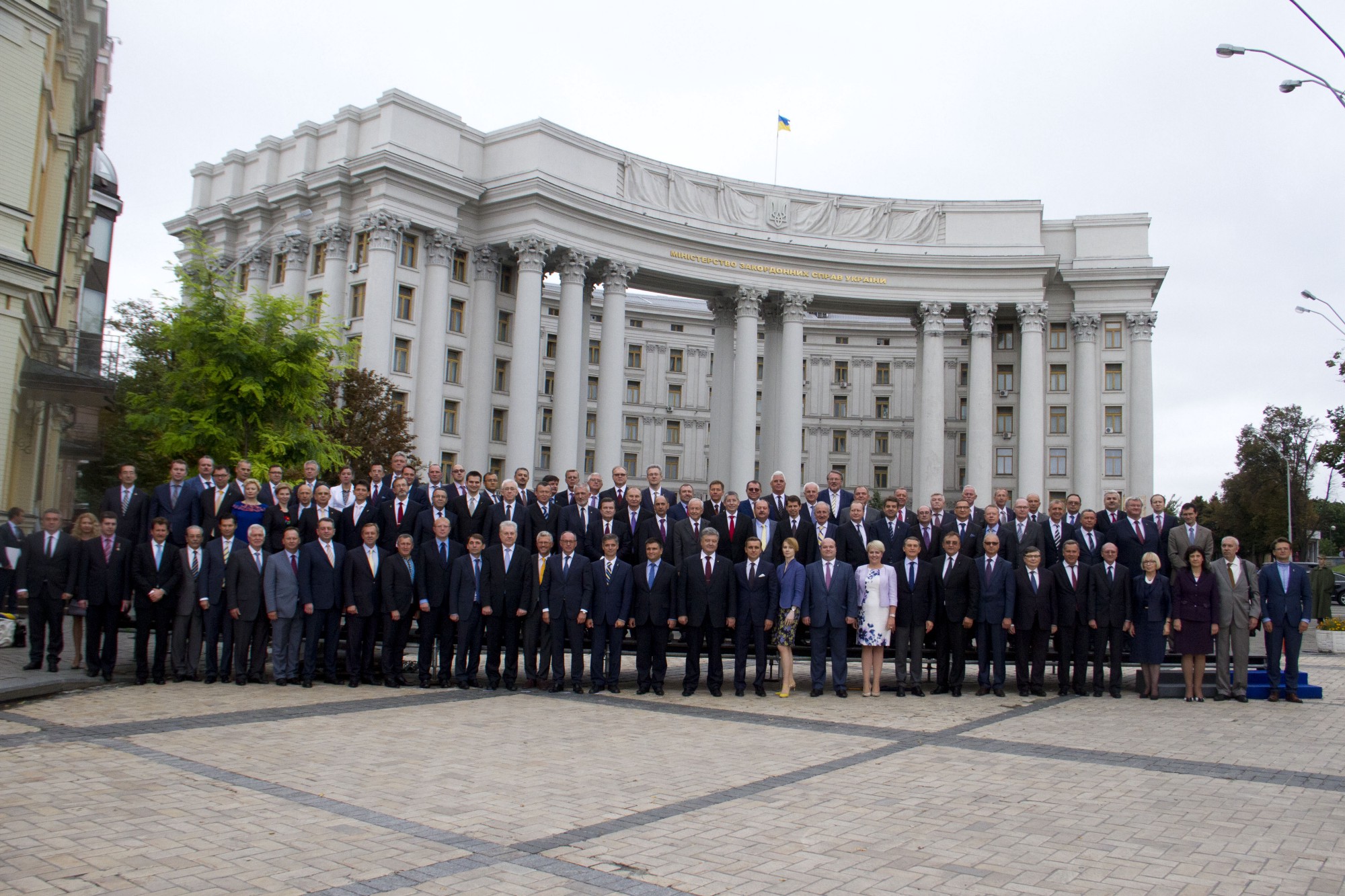image from article
Bradford Betz and Alya Shandra, euromaidanpress.com
Ukraine’s Foreign Policy Audit, a project by the Institute of World Policy, sought to fill in the strategic gap by assessing the strengths and weaknesses of Ukraine’s foreign policy by questioning Ukrainian and foreign experts, diplomats, and Ukrainian citizens to share their vision. 17 separate studies of Ukraine’s bilateral relations were conducted that included 102 experts from 30 countries, 136 interviews, 1500 participants of public debates and 2000 media publications. Here we provide the report’s main findings.
View from inside: disorganization and Russian aggression are the main problems
According to the report, Ukraine’s internal experts see the lack of consistency, weak diplomatic corps and lack of ambassadors in key countries, and conflict with Russia as their most pressing problems. But they positively view the signing of the Association Agreement with the EU and the international support they’ve received in containing Russian aggression. The global trends that most alarm Ukraine are the presidency of Donald Trump and weakened consolidation in the European Union.
Ukrainians believe that they can most positively contribute to the global and regional stability by carrying out reforms and containing Russian aggression.
View from outside: corruption and lack of reforms are the main problems

Snapshot from the report
Foreign experts see Ukraine’s main problemsto be its internal policy(namely, implementing reforms and overcoming corruption), the conflict with Russia, and a lack of a clear foreign policy strategy. Similar to the Ukrainian experts, they believe the global trends that will have the biggest impact on Ukraine are Trump’s presidency, the rise of right-wing populism in Europe, and theunpredictability of Russia’s regime.
But the experts believe that Ukraine is precisely the case where one should start with herself in order to change the world.
Ukraine could influence conflict resolution in other states, particularly through peacekeeping missions abroad, driving reconciliation between East and West, stabilization of relations between Russia and the EU.
Time for Ukraine to see its intrinsic value
Foreign and domestic experts differed radically in their assessment of how domestic reforms impact foreign policy: for foreigners, corruption and delays with reforms constitute the problem number one, while only one Ukrainian respondent gave a similar answer.
But apart from that, foreign and domestic experts view Ukraine’s added value differently, too. For the foreigners, it is Ukraine itself, first and foremost, as a model of positive transformation: implementation of reforms and the fight against corruption. The Ukrainians are mostly inclined to think that, for the world, the key benefit from Ukraine lies in curbing the aggression by Russia, including on a global level.
But there’s two things both camps agree on: Trump as US president, as well as weakened consolidation within the EU and the spread of Euroscepticism, are sure to have an impact on Ukraine’s prospects on the international arena.
Ukraine needs a foreign policy strategy, its ambassadors say

Ukrainian ambassadors stand next to the Ministry of Foreign Affairs during the 22-24 August 2016 meeting. Photo: MFA Ukraine
The IWP conducted an anonymous survey of 6 questions assessing the strengths and weaknesses of Ukraine. Out of 83 Ukrainian ambassadors that were sent the questionnaire, only 34 responded – a sign that only a small fraction of the diplomatic service is ready for an open discussion. Remember, these are the people who are conducting the everyday foreign policy of Ukraine in their countries of service.
It turns out that the number one problem restricting their capability to promote Ukraine’s interests are internal issues: the lack of progress in reforms, as well as corruption and political scandals, which directly impacts Ukraine’s image. Additionally, the entire diplomatic service doesn’t have enough financial and logistics support.
Apart from that, they named a lack of foreign policy strategy with clear priorities and ways of promoting the state and mentioned a problem all too common for Ukraine – when private businesses interests too often prevail over national ones. Right now, there is poor communication between authorities in the implementation of foreign policy objectives.
When there is a lack of strategy, look to the lack of people developing a strategy. The ambassadors noted that the structure of the Ministry itself currently lacks any powerful analytical department that would be involved in long-term planning, identify of critical objectives and ways to reach them.
Surprisingly, Russian aggression ranked near the bottom of concerns. This may, as the audit states, indicate that Ukrainian diplomats are aware that the key reason for an inefficient foreign policy stems from within, and their desire to change the situation.
In this, they are closer to the opinions of foreign experts, who also noted that corruption is the biggest problem.
Patriotism – good for diplomats, useless for investments
And the strongest feature of Ukraine’s foreign policy? Patriotism, it turns out. The diplomatic corps, with meager financial support and ample bureaucratic and institutional problems, is boosted by the awareness of the seriousness of the threats and challenges faced by Ukraine, with the desire to selflessly serve their state becoming nearly the only incentive to perform one’s duties diligently.
In this, the diplomatic corps is a “miniature Ukraine” of sorts, where many an analyst has named a strong civil society as its greatest asset.
But patriotism isn’t enough for foreign investments. To attract them, Ukraine will have to make serious reforms. Until then, individual ambassadors will determine progress rather than the system as a whole. Nevertheless, Russian aggression has inadvertently mobilized the Ukrainian diplomats to find creative solutions and use every opportunity to strengthen and protect Ukraine’s positions.
What the ambassadors would change
- Introduce strategic planning, identify the short- and medium-term primary goals.
- Reform the structure and decision-making system of Ukraine’s Ministry of Foreign Affairs, focus on results not process, develop a well-thought-out and systematic personnel policy.
- Increase financial support for the diplomatic service.
- Improve information support for the diplomats’ activities, cut on bureaucracy and abandon a centralised approach to the implementation of foreign policy.
- Strengthen the economic component of Ukrainian diplomacy and promote Ukrainian exporters
- Strengthen public diplomacy, in particular, make greater use of cultural diplomacy tools to promote Ukraine abroad, cooperate with Ukrainian communities living abroad.
Time to make new friends but keep the old
While Ukraine’s diplomats noted that Ukraine needs to continue focusing on Euro-Atlantic integration, to be a more active partner of the EU and the U.S. in the international arena, they also stressed that the time is ripe to make new friends – especially those that view Ukraine’s national security as their national security. Poland, the Baltic states, Romania, Norway, Sweden, are all good candidates to establish politico-economic and even defensive alliances. But Ukraine shouldn’t limit itself – the ambassadors say that searching for approaches to states displaying pro-Russian sympathies won’t hurt, as well as for relations with countries in regions that could be potential markets for exports, e.g., Asia or Africa.
To successfully integrate into the Euro-Atlantic security and economic space, Ukraine must demonstrate that it can be a source for peace and stability in the region. This can be summed up with the phrase, a strong Ukraine equals a stable Europe.
As of now, there is a near total consensus that Ukraine’s foreign policy must undergo profound changes. Ukrainian citizens’ top priorities are the search for new markets and integration into the EU and NATO. Levels of support for cooperation with Russia are primarily determined by region with most supporters of cooperation with Moscow being from the east. Nearly all Ukrainians, however, are against declaring war with Russia.
Ukraine needs ambassadors in key countries
Ukraine lacks ambassadors in Belarus, Czech Republic, Georgia, Kazakhstan, Romania, and Georgia. The Absence of an ambassador in a particular country reflects disinterest and does further harm to Ukraine’s reputation. As of June 2015, the position of the head of Mission of Ukraine to NATO remains vacant.Furthermore, web-pages of Ukraine’s diplomatic missions abroad must be more professional. Many of these sites are updated irregularly and even lack the host country’s language.
Summing up, a foreign policy strategy for Ukraine should involve all of Ukraine’s public institutions in its implementation.
The best thing that Ukraine can do for the world is work on itself first. Positive internal reforms can transform the world’s perception of Ukraine from a “victim country” to a “winner country.”

No comments:
Post a Comment